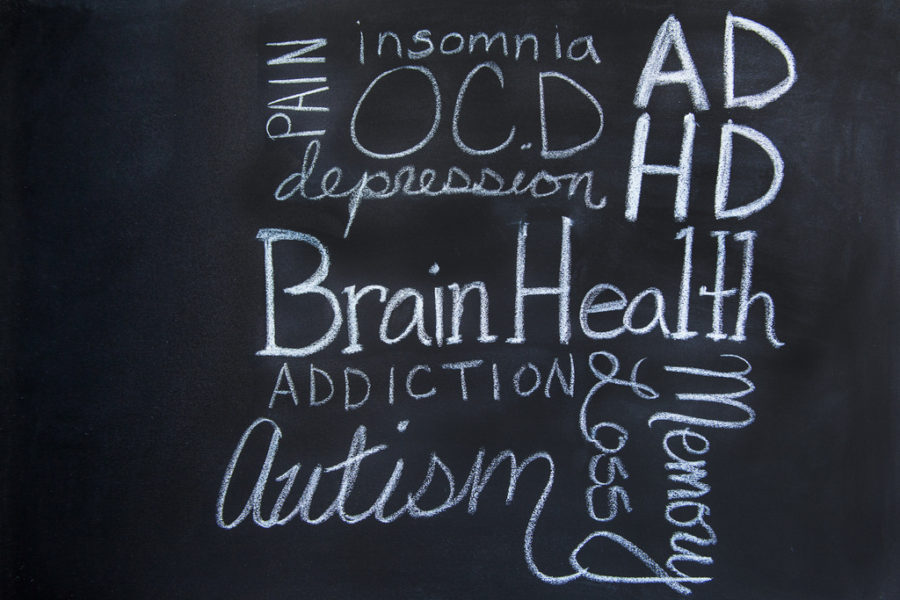Toward A More Mentally Stable McIntosh
Apr 16, 2018
Over the past five years, the rate of severe youth depression has increased from 5.9% to 8.2%, and 7.7% of minors have no access to mental health services through their private insurance (Mental Health America). One in five adults in the United States have a mental health condition, but only 44% ever receive treatment; a conservative estimate of Americans never receiving treatment in their life is 17,600,000 people.
With a lack of proper health care, increasingly competitive college acceptance guidelines and more social isolation than ever before, it’s no wonder that students are becoming more depressed and anxious.
This trend in declining mental health among teenagers has had an enormous impact on the McIntosh community this year. Some students speculate that mental health is an issue at McIntosh due to the increased pressure they feel to do well at a school known throughout the region for its high academic expectations.
Naseem Amini, a senior who is currently taking four Advanced Placement classes, explained, “students feel the pressure of ‘you must do well, you must graduate, and perform at a high level and if you don’t, you have failed,’ and that causes a stressful environment. Many kids already have anxiety, and this makes it worse.”
Mrs. Fine, the principal, acknowledges that the students are feeling increased pressure, but she’s not sure where the pressure is coming from. She was reluctant to identify a specific source for the increased stress and anxiety the student body says it’s experiencing.
“Where is that derived from? Is it the high school that is placing that stress on them? Is it the home? Is it peer structures? Is it colleges? There is [sic] a variety of responses to that question,” she said.
Perhaps there is no definitive answer to such a subjective question. Fine believes increased stress and anxiety is likely a result of students who are choosing to overload on AP courses throughout high school. She maintained, however, that no one at the school is making the students take on these challenging course loads. In fact, the school requires students to attend a meeting about the demands of taking 4 or more AP courses in an academic year.
While no one is forcing them to take on demanding course loads, it is common for colleges and universities to require a large number of AP courses on student transcripts for them to be considered for admission; students who want to get in to good schools, therefore, are in a difficult position. Fine believes if the student cannot handle the extra work they must deal with when taking one or more AP classes, they should consider other, less rigorous, college and decrease their course load accordingly.
Yet, no one can deny that McIntosh prides itself on producing students who achieve at high levels and receive admission to prestigious colleges and universities around the country. This focus necessarily makes students feel like they might be deemed failures if they don’t live up to the school’s reputation for excellence.
According to Amini, “the way the administration speaks to the kids makes them feel like they’re not doing well enough if they’re not at a certain level.”
While it doesn’t seem that the school will change its focus or limit the number of AP classes students can take, students suggest that offering a few classes that are more creative or reflective in nature, rather than academic rigor from bell to bell, could help students manage their stress more effectively. Students also suggest having a traditional study hall period during which they can complete the massive amounts of homework they receive from their rigorous classes.
“[The] administration needs to provide easier classes for kids who want to take a break. They could give us yoga or meditation. Juniors would especially need this because they’re crying about school work every night,” Senior Cullen Finnerty said.
While Finnerty was clearly joking about the nightly crying, behind his joke in an uncomfortable truth. The work load, for many, is too much. The other high-achieving seniors at Finnerty’s table agreed: because of their hard work, they feel they have earned a period to unwind.
The juniors at the table nearby agreed. Because of the pressure juniors feel — college is looming around the corner, so they are taking an intense course load and participating in extracurriculars to beef up their resumes — many feel that an hour built into the school day for catching up on school work would be incredibly helpful.
Of course, much of the anxiety experienced at McIntosh comes from the college application process itself, which is a huge part of the daily conversation due to the county’s push to have all students go to college after they graduate. Junior Afra Abdul isn’t sure that the intense focus on college is productive.
“Some kids just don’t want to go to college – or they can’t – and the counselors are trying to be more knowledgeable about other options,” she said. “But, still, it’s not ‘accepted’ to not go to college and go into the workforce right away.”
Abdul is not the only student who thinks the counseling department needs to provide more resources for students. While college admission tends to be the focus of the counseling department, many students want more support when it comes to mental health issues that come with increased anxiety and depression, whatever its source.
In general, the department often seems more reactive rather than proactive; for example, they only stepped in to try to help the student body manage its mental health after a crisis had occurred. While they presented the Signs of Suicide (SOS) program to arm students with the tools to help themselves and friends, the takeaway message from the program was unclear and muddled to some.
“I just feel like it could’ve been done in a better way. They needed to explain everything more, and, like, more in depth. That would’ve made it more useful” Senior Olivia Ross explained.
The counseling department does inform students if they believe students need to seek help, whether that be a therapist or an inpatient/outpatient program, but this is done on a student by student basis. With students apparently suffering from stress, anxiety and depression on a school-wide level, it would be beneficial to the student body if the department were to provide some whole-school mental health education on a regular basis aimed at helping students learn to cope.
Another way to help students get the mental care they need is providing in-school therapy; as it currently stands, that is not an option for counselors at McIntosh.
Mrs. Fine explained, “[The counselors] are not allowed to provide therapy. It is against their code of ethics to do that. They are not therapists to do that, that’s why they give resources to students.”
While the county does have several school psychologists on staff who work with a number of schools, they do not currently provide therapeutic services on campus.
According to Ms. Erin Roberson, the Director of Human Resources for Fayette County Schools, “They could act in an consultative role or provide training to help with specific needs, but they would not have adequate time to conduct ongoing small group and individual support due to their other responsibilities.”
Yet, finding a way to get group and individual mental health support in each school might be worth considering. Up to 65% of people with severe depression symptoms aren’t getting help; having access to therapeutic services on campus might help improve the overall mental health climate of McIntosh.
This growing mental health crisis isn’t just a McIntosh problem, of course. Mrs. Fine noted that rates of anxiety and depression are going up all over the country. The problem is clearly enormous, and earching for solutions seems vital, especially for high-risk populations like teenagers.










